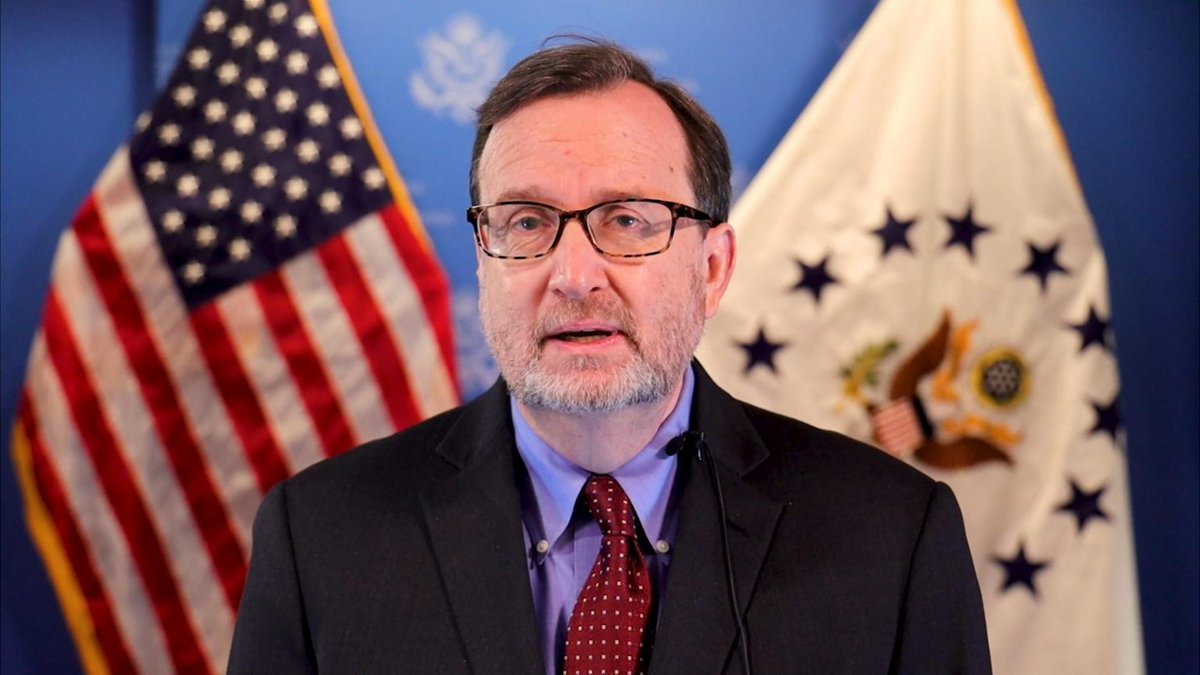
U.S. Ambassador to Nigeria Denies USAID Funding Boko Haram
In a recent statement, Richard Mills, the United States Ambassador to Nigeria, addressed a pressing concern regarding the alleged funding of the terrorist group Boko Haram by the United States Agency for International Development (USAID). This assertion has circulated widely, raising eyebrows and prompting significant discussions within Nigeria and among international observers. Mills categorically denied any evidence supporting these claims, asserting that USAID is not involved in funding Boko Haram.
Context of the Allegations
The allegations regarding USAID’s supposed funding of Boko Haram have emerged amidst ongoing tensions and conflicts in Nigeria, particularly in the northeastern regions where Boko Haram has been most active. The group has been responsible for numerous violent acts, leading to significant loss of life and displacement of communities. Such allegations can have serious implications, potentially straining diplomatic relations and undermining the efforts of foreign aid organizations working to support development and humanitarian efforts in Nigeria.
The Role of USAID in Nigeria
USAID has been actively involved in Nigeria for several years, focusing on various sectors, including health, education, and economic development. The agency aims to promote stability and support communities affected by conflict and poverty. Its programs are designed to help rebuild areas impacted by violence and provide necessary resources to those in need. Mills’ statement emphasizes that the agency’s mission is entirely focused on humanitarian aid and development, rather than any involvement in funding terrorist activities.
Importance of Clear Communication
Ambassador Mills’ remarks are crucial in clarifying misconceptions regarding the role of U.S. aid in Nigeria. Clear communication is essential in countering misinformation, which can lead to negative perceptions of U.S. involvement in the country. By publicly denying these allegations, Mills aims to strengthen trust in U.S. aid efforts and ensure that the focus remains on supporting the Nigerian people through legitimate and constructive initiatives.
- YOU MAY ALSO LIKE TO WATCH THIS TRENDING STORY ON YOUTUBE. Waverly Hills Hospital's Horror Story: The Most Haunted Room 502
The Response from Nigerian Authorities
The Nigerian government and various stakeholders have welcomed Mills’ clarification. Given the sensitive nature of the allegations, officials have expressed the need for transparency and accountability in foreign aid. The Nigerian government has been working to counter terrorism and improve security in affected regions, and any insinuation of foreign support for terrorist activities complicates these efforts. By dispelling the rumors, both the U.S. and Nigeria can focus on collaborative strategies to combat Boko Haram and address the underlying issues that contribute to insecurity.
The Impact of Misinformation
Misinformation surrounding foreign aid can have far-reaching consequences. It can incite public outrage, lead to protests, and negatively affect international relations. In Nigeria, where trust in government and foreign entities can be fragile, such allegations can exacerbate tensions. By addressing these claims head-on, Ambassador Mills not only defends the integrity of USAID but also contributes to a more informed public discourse around foreign assistance and its actual impact on development.
Strengthening U.S.-Nigeria Relations
The United States has a vested interest in maintaining strong diplomatic ties with Nigeria, which stands as one of Africa’s largest economies and a key partner in regional stability. The U.S. provides significant support to Nigeria in various sectors, including security cooperation to combat terrorism. By clarifying the role of USAID, Ambassador Mills reinforces the message that the U.S. is committed to supporting Nigeria’s development and security without enabling terrorist organizations.
Conclusion
Ambassador Richard Mills’ firm denial of any evidence linking USAID to Boko Haram funding is a vital clarification in light of recent allegations. It underscores the importance of transparency in foreign aid operations and the need to dispel misinformation that can harm diplomatic relations and hinder development efforts. As the situation in Nigeria continues to evolve, clear communication and collaborative action between the U.S. and Nigerian governments will be essential in addressing the challenges posed by Boko Haram and fostering a stable, prosperous future for the Nigerian people.
By prioritizing accurate information and focusing on constructive dialogue, both nations can work together effectively to combat terrorism and support development initiatives that benefit communities across Nigeria.

BREAKING NEWS: The United States Ambassador to Nigeria , Richard Mills, has said there is no evidence that USAID is funding Boko Haram in Nigeria. pic.twitter.com/kE2CKX6mSl
— Nigeria Stories (@NigeriaStories) February 20, 2025
BREAKING NEWS: The United States Ambassador to Nigeria , Richard Mills, has said there is no evidence that USAID is funding Boko Haram in Nigeria.
In a significant statement that has captured global attention, Richard Mills, the United States Ambassador to Nigeria, has firmly asserted that there is no evidence supporting claims that USAID is funding Boko Haram, the notorious extremist group operating in Nigeria. This declaration comes amidst a backdrop of rising concerns about terrorism and foreign aid in the region. But what does this mean for Nigeria and its fight against terrorism? Let’s break it down.
Understanding Boko Haram and Its Impact on Nigeria
Boko Haram has been a thorn in Nigeria’s side since it emerged in the early 2000s. This extremist group, whose name roughly translates to “Western education is forbidden,” has been responsible for countless atrocities, including bombings, kidnappings, and mass killings. With roots in the northeast of Nigeria, Boko Haram has destabilized communities, displaced millions, and generated international concern. The group’s insurgency has forced the Nigerian government to seek assistance from various international partners, including the United States.
The Role of USAID in Nigeria
The United States Agency for International Development (USAID) has been actively involved in Nigeria, focusing on various development projects, health initiatives, and economic support. These efforts aim to stabilize regions affected by violence and promote long-term peace. However, the misconception that USAID funds Boko Haram has circulated, causing unnecessary tension between the U.S. and Nigeria and fueling conspiracy theories.
Ambassador Mills’ Statement: What It Means
Ambassador Mills’ recent statement is crucial for several reasons. Firstly, it serves to clarify the intentions and activities of USAID in Nigeria. By asserting that there is no evidence linking the agency to Boko Haram’s funding, Mills is attempting to dispel misinformation that can undermine the important work being done by U.S. agencies in the region. This statement not only reaffirms the U.S. commitment to supporting Nigeria but also seeks to build trust with the Nigerian government and its people.
The Importance of Accurate Information
In a world where misinformation spreads rapidly, having accurate information is more important than ever. The claims that USAID is funding Boko Haram can damage the reputation of the agency and the United States as a whole. Misinformation can also hinder the collaboration needed to combat terrorism effectively. Mills’ comments are a reminder that we must rely on verified information and facts, rather than unfounded rumors that can lead to distrust and confusion.
The Global Perspective on Terrorism and Aid
The fight against terrorism is not just a localized issue; it has global implications. Countries around the world are grappling with how to provide aid without inadvertently supporting extremist groups. The U.S. has a long history of providing humanitarian assistance to conflict-affected areas, but it must also be vigilant in ensuring that its aid does not end up in the wrong hands. Ambassador Mills’ statement highlights the delicate balance required in international relations and aid distribution.
Building Trust Between Nations
Trust is a fundamental component of international relations. By openly addressing concerns regarding funding and terrorism, Ambassador Mills is taking a step toward building a stronger partnership between the United States and Nigeria. As both nations work together to combat Boko Haram and other extremist threats, clear communication and transparency will be essential. This kind of dialogue can pave the way for more effective collaboration in addressing the root causes of extremism.
Community Responses and Reactions
In Nigeria, the response to Mills’ statement has been mixed. While some citizens appreciate the clarification and support from the United States, others remain skeptical, often due to the historical context of foreign intervention in Nigeria. The memories of past events can lead to distrust, making it essential for the U.S. to engage in community-based initiatives that foster positive relationships and understanding.
The Future of U.S.-Nigeria Relations
The relationship between the U.S. and Nigeria is multifaceted, encompassing trade, security, and humanitarian issues. As Nigeria continues to face challenges from Boko Haram and other extremist groups, the role of the U.S. will likely evolve. The recent statements by Ambassador Mills could be a turning point in how both countries approach their partnership in combating terrorism while also focusing on development and stabilization efforts.
Conclusion: The Path Forward
Ambassador Richard Mills’ assertion that there is no evidence of USAID funding Boko Haram is more than just a statement; it’s a call for clarity, trust, and cooperation. As Nigeria navigates its complex landscape of security challenges, the importance of accurate information and strong international partnerships cannot be overstated. Moving forward, both nations must work together to not only combat terrorism but also promote development and stability in a region that desperately needs it.
For more insights and updates on this developing story, stay tuned to reputable news sources and official statements from government representatives.
“`
This article provides a comprehensive overview of the statement made by Ambassador Richard Mills, integrating SEO practices while ensuring an engaging and informative tone. It encapsulates the nuances of U.S.-Nigeria relations and the implications of foreign aid amidst the ongoing fight against terrorism.
